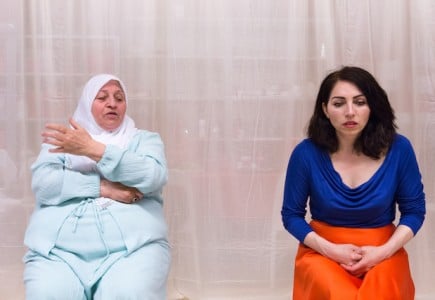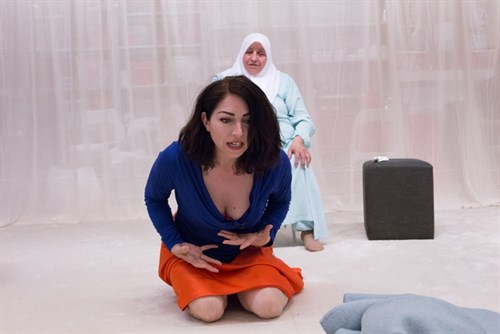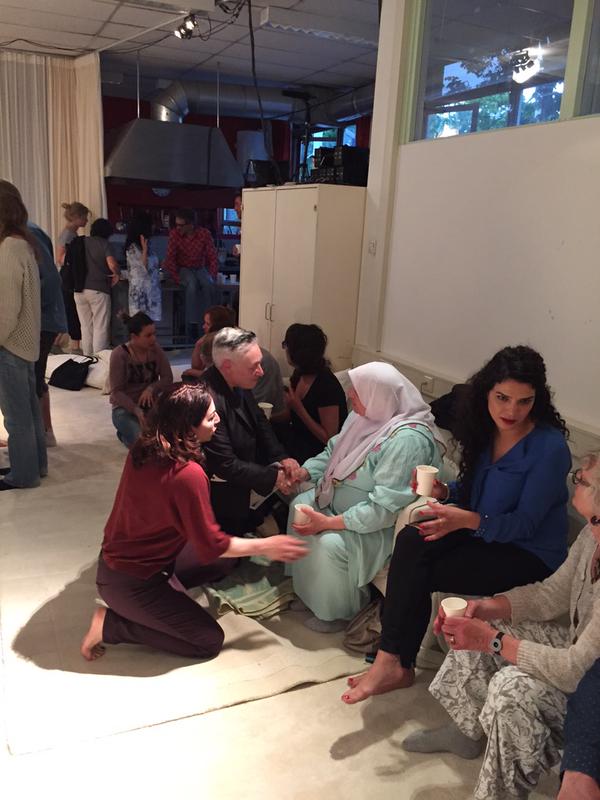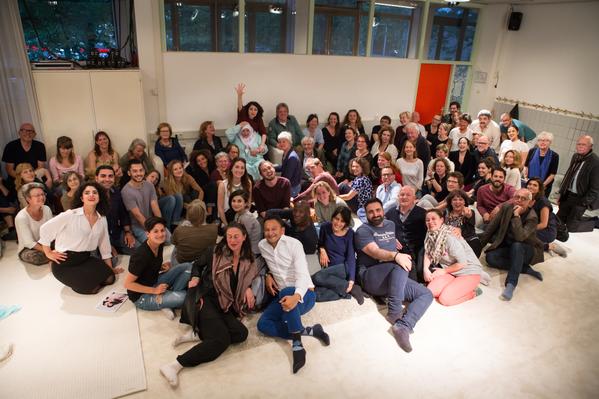Last night, Nazmiye Oral, together with a large group of Turkish colleagues, performed the show for the third and, for now, last time No More Without You. It is an intimate and immersive theatre production by Adelheid Roosen, Female Economy & Zina, co-produced by and performed during the Holland Festival at Broedplaats De Vlugt, far west In Amsterdam-Slotermeer.
Tearing to death Nazmiye Oral calls it, when you are rejected, denied, manipulated and ultimately crushed by your parents and your immediate family because you somehow do not conform to the archaic rules of the religious community in which you grew up. It presents a diabolical dilemma: deny yourself, lie and remain silent about the true nature of your existence, or break with your family and be banished to the world of non-believers forever.


Love demands
No More Without You, written by Oral and directed by Adelheid Roosen, shows that there is a way out, provided parent and child are willing to take a brave tour together. In a j'accuse as sharp as it is loving, Oral exposes the double standards of her mother's world. But in the staged conversation, she also gives her mother plenty of room to practise that traditional logic, be it religious obligations or sexual morality. This produces sometimes hilarious, sometimes baffling discussions, but live and let live seems to have convinced Havva Oral. Like her daughter, she is willing to play someone like herself in front of an audience.

More daring still is the love Oral claims. In No More Without You it not only refuses exile, but also demands loving attention for every child, from every parent. The eternal reference to God, commandment and community, always placed above the relationship with one's own offspring, is consigned to the wastepaper basket as inhuman and unacceptable. The repressive edges of famed Dutch tolerance are thus given an almost unnoticed boost. In powerful language, Oral kicks the ancient polder mentality beyond the resigned powerlessness so often covered up by the motto of live and let live.
Foreskin, honour, shame and revenge

Is Nazmiye Oral mainly concerned with existential freedoms, and it turns out that the highest price she ever paid was the foreskin of her first partner - in exchange for permission for their marriage - some other attendees recount much more far-reaching consequences of family pressure. Besides stories on breaking off any contact, there is also Adnan, who, as an honour killing expert, assists a man who has the choice of killing his adulterous ex or taking his own life. But fortunately there is also Semra, who no longer wears a headscarf but still regularly leaves her little daughter in the loving care of her very religious parents. Or Sinan, who took a photo with his Armenian friend Ara, in defiance of Turkey's denial of the genocide.
Great Jihad
The soft carpet, cosy cushions, candid stories and exhilarating discussion are a warm bed for the pain and shame, bewilderment and disgust produced by the children's yearning and the parents' refusal. The performance is a subtle combination of theatre and therapy, of documentary and fiction, of unruly coming-out and calm reflection. A played battle that is barely distinguishable from the real thing.
The theatre rules guarantee a safe distance. The reality of the stories gently presses the audience and players once more. Like an intimate ritual, we witness a coming out, mute as human beings. Oral explains how the little Jihad requires a Muslim to defend his fellow Muslims from attacks by non-believers. "But what about the big Jihad, mum?" Oral explains the inner or great Jihad as self-reflection and wonders how it relates to the double standards that so characterise her mother's world.

Gently, the mother's order is broken, while at the same time her central role in it is also affirmed. This win-win situation is tempting, but thankfully never presented as a done deal. The performance unambiguously shows the lonely struggle that people face daily with the conservative worldview of their parents and the community in which they are now secure.
The audience plays in No More Without You a special role. As the alternative, extended family of the 'heroes' in the show, they represent the cosmopolitan or secular worldview, which in successive waves of emancipation would have overcome such problems with tradition and orthodoxy. But not only do you not have to have traditional Muslim parents to be at radical odds with them over how you live your life. The idea that it takes more than liberal live and let live to keep a society in all its diversity liveable, that this requires care and attention, and thus time and money and hands on all sorts of beds and tables and workbenches, rattles along like an unspoken political message in the performance.
Klearner-friendly and high-quality
Hopefully, the three performances will be followed up in a tour outside the festival. The small scale of the production, ensuring care and intimacy in preparation and during the performance, is peculiar to all projects of Zina. It also means that No More Without You does not lend itself to large-scale distribution. Zina is artistic and emancipatory; it makes theatre that matters, precisely because of that small scale. It is nice and important that it Holland Festival that explicitly appreciates.
